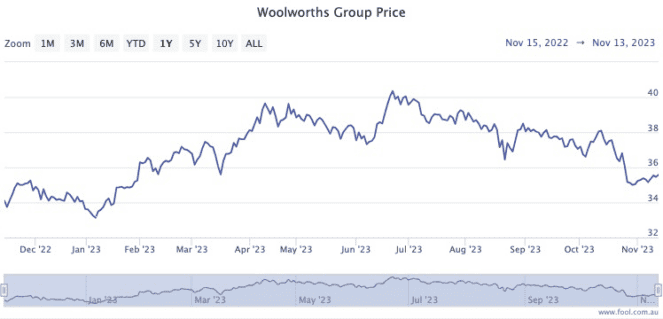Interest rates are a whopping 425 basis points higher than they were just 18 months ago (as if you needed to be reminded).
With the Reserve Bank of Australia doing its best to quash rampant inflation, Australian consumers have been forced to shut their wallets and cut back on unnecessary spending.
In times like these, it makes sense that ASX consumer staples stocks could prove a reliable shelter.
After all, people still have to eat, right?
However, the share price for the nation's dominant supermarket has not lit the world on fire.
Woolworths Group Ltd (ASX: WOW) shares are, in fact, down 11.5% since 21 June. The company's share price has only risen 5.7% over the past year as Aussies have strained under cost-of-living pressures.
So is this S&P/ASX 200 Index (ASX: XJO) stock about to break out? Should you be piling onto it?
The fresh food people have the experts polarised
The answer to that is a resounding… maybe.
Professional investors seem to be divided on Woolworths, perhaps put off by how it hasn't shot upwards during the part of the economic cycle when it has a great chance to do so.
According to CMC Markets, seven analysts rate Woolworths shares as a buy, six reckon it's a hold, and three are urging investors to sell.
Goldman Sachs analysts are bullish, upgrading the share price target for the supermarket giant a fortnight ago.
"We believe the business has among the highest consumer stickiness and loyalty among peers, and hence has strong ability to drive market share gains via its omni-channel advantage, as well as pass through any cost inflation to protect its margins, beyond market expectations," their note read.

"The stock is trading below its historical average (since 2018), and we see this as a value entry level for a high-quality and defensive stock."
Meanwhile, just a couple of days before that recommendation, Medallion Financial Group director Philippe Bui rated Woolworths as a sell.
"We're concerned about lower operating margins and continuing competition pressures," he said.
"The supermarket group faces rising wages and possible margin compression in the discretionary retail part of the business in fiscal year 2024."
While Bui admitted Woolworths possesses defensive attributes that are sought after in troubled times, he thought there are better options on the ASX.
"There's many more appealing businesses at lower valuations and higher dividend yields, in our view."
Perhaps a dividend payout might help make up the minds of some investors.
Woolworths shares currently hand out a fully franked dividend yield of 2.9%.









